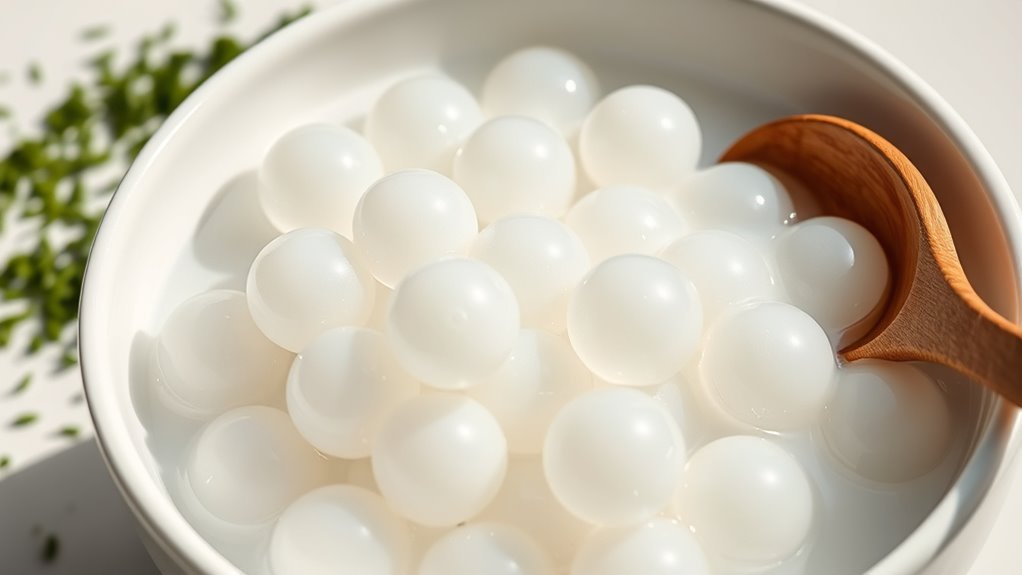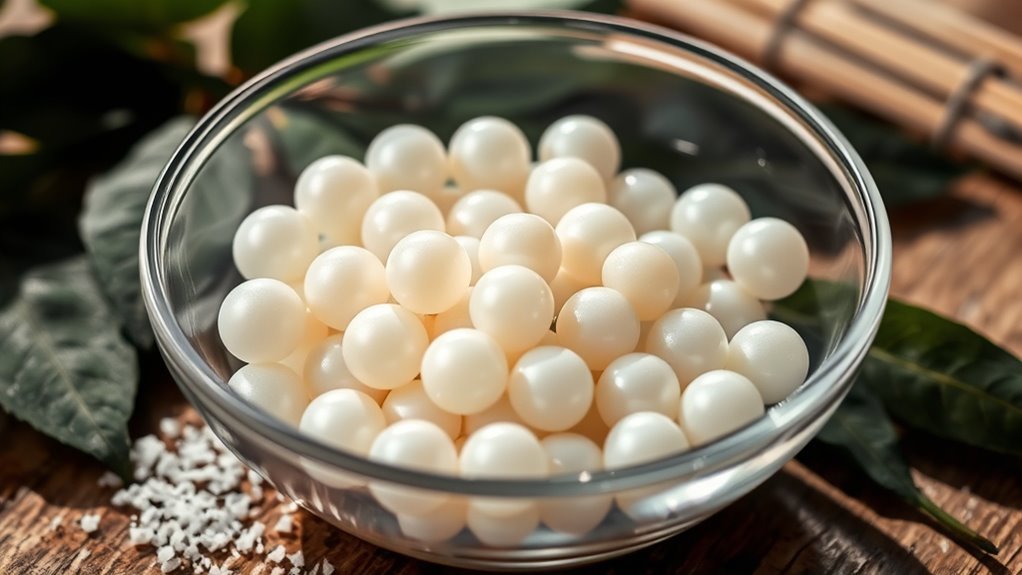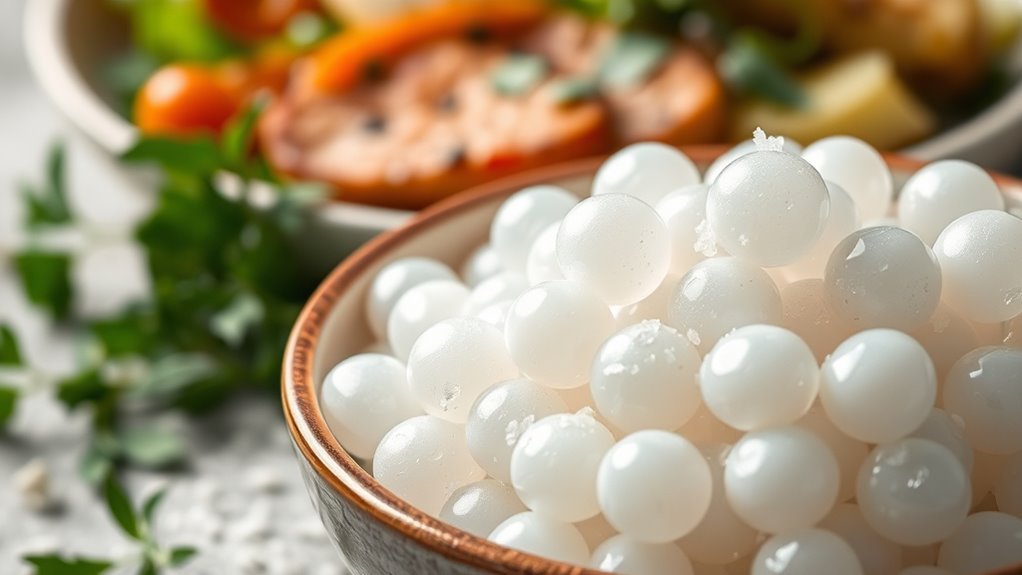Tapioca isn’t keto-friendly due to its high carbohydrate content, which can disrupt ketosis. With around 30 grams of carbs per serving, it’s important to limit intake if you want to stay within the 20 to 50 grams of carbs recommended for a ketogenic diet. While it offers quick energy and is gluten-free, it lacks essential nutrients, requiring careful dietary planning. There are alternatives available that can help maintain your keto goals while still enjoying meals.
Understanding Tapioca: What It Is and How It’s Made

Tapioca, a starchy substance derived from the cassava root, is commonly used in various culinary applications. Its origins trace back to South America, where indigenous cultures first cultivated cassava for its edible tubers. The process of making tapioca involves peeling, soaking, and grinding the cassava root, followed by extracting the starch. This starch is then processed into different forms, such as pearls, flour, or flakes, each serving unique culinary purposes. You’ll find tapioca featured in dishes like puddings, bubble tea, and as a thickening agent in soups and sauces. Understanding its origins and processing helps you appreciate tapioca’s versatility and significance in diverse cuisines worldwide, offering you the freedom to explore its many uses in your cooking.
Nutritional Profile of Tapioca

While tapioca is often celebrated for its culinary versatility, its nutritional profile is essential to evaluate, especially for those following specific dietary plans. Understanding the benefits and drawbacks can help you make informed choices:
- Tapioca Benefits: It’s gluten-free and may be easier to digest for some people.
- Energy Source: Tapioca provides quick energy due to its high carbohydrate content.
- Low Nutrient Density: It lacks essential vitamins and minerals, which could be a concern for balanced diets.
Incorporating tapioca into your meals can offer some advantages, but be aware of its limitations. If you’re looking for nutrient-rich options, you might need to supplement with other foods to meet your dietary needs effectively.
Carbohydrates in Tapioca: A Closer Look

Although many enjoy tapioca for its unique texture and versatility, it’s vital to examine its carbohydrate content, especially for those on a ketogenic diet. Originating from the cassava plant, tapioca is primarily composed of starch, making it high in carbohydrates. A typical serving contains around 30 grams of carbs, which can greatly impact your daily limit if you’re aiming for ketosis. There are various tapioca varieties, including pearls and flour, each with similar carbohydrate profiles. While they can be a delightful addition to certain dishes, it’s important to be mindful of portion sizes. If you’re pursuing a keto lifestyle, understanding tapioca’s carb load can help you make informed choices that align with your dietary goals.
The Role of Carbohydrates in a Ketogenic Diet
When considering a ketogenic diet, understanding the role of carbohydrates is essential for achieving and maintaining ketosis. While carbs are often seen as the enemy in keto, they can still play a part in your dietary balance if you choose wisely. Here are some key points to remember:
Understanding carbohydrates is vital for a successful ketogenic diet; choose wisely to maintain your balance and achieve ketosis.
- Focus on low-carb, nutrient-dense carbohydrate sources, like leafy greens and non-starchy vegetables.
- Limit high-carb foods that can disrupt your ketosis, such as grains and sugars.
- Monitor your total carb intake to stay within your daily limits for ideal results.
- Keeping carb intake between 20 to 50 grams daily is crucial for achieving ketosis.
Potential Impact of Tapioca on Ketosis
Tapioca, derived from cassava root, is often celebrated for its unique texture and versatility in cooking, but its high carbohydrate content raises concerns for those following a ketogenic diet. With about 38 grams of carbs per 100 grams, tapioca consumption can greatly impact your ability to maintain ketosis. When your body enters ketosis, it primarily relies on fat for energy instead of carbohydrates. Consuming tapioca may disrupt this metabolic state, leading to increased glucose levels, which can hinder fat burning. While it’s possible to enjoy tapioca in moderation, you’ll need to carefully track your carb intake to avoid exceeding your daily limits. Ultimately, considering the ketosis effects is crucial when deciding whether to incorporate tapioca into your meals. Additionally, understanding daily carb limits is essential for maintaining ketosis and achieving desired results.
Alternatives to Tapioca for a Keto Diet
If you’re looking for alternatives to tapioca that fit within a keto diet, there are several options worth considering. These substitutes can help you maintain your low-carb lifestyle while still enjoying diverse meals.
Explore keto-friendly alternatives to tapioca that keep your meals diverse and low in carbs.
- Cauliflower rice: A versatile base for stir-fries and bowls, it’s low in carbs and rich in nutrients.
- Zucchini noodles: Also known as “zoodles,” they’re a great pasta substitute, perfect for your favorite sauces.
- Shirataki noodles: Made from konjac, these noodles are low-calorie and provide a satisfying texture.
Additionally, you can explore baking with almond flour, coconut flour, flaxseed meal, or psyllium husk to create keto-friendly recipes without the carbs associated with tapioca. Enjoy experimenting with these alternatives! Shifting to low-carb options can help you maintain ketosis and enjoy your meals without compromising your diet.
Making Informed Choices: When to Indulge in Tapioca
How do you navigate the occasional cravings for tapioca while adhering to a keto diet? It’s all about making informed choices and employing smart indulgence strategies. If you decide to treat yourself, consider portion control as your best friend. A small serving can satisfy your craving without derailing your keto goals.
You might also want to enjoy tapioca on special occasions or as a reward for your hard work. Balance is key; if you indulge, plan your meals around it to maintain overall carb intake. Remember, it’s not about deprivation but rather enjoying life while staying mindful of your dietary choices. With thoughtful decisions, you can embrace the freedom of indulging in tapioca when the moment calls for it.
Frequently Asked Questions
Can Tapioca Be Consumed in Small Amounts on Keto?
Sure, you can consume tapioca in small amounts on keto, if you enjoy living on the edge! Just remember, tapioca servings can spike your carb intake quickly. While it might be tempting to indulge, consider keto alternatives like cauliflower rice or zucchini noodles that won’t sabotage your goals. Moderation is key, so if you choose tapioca, balance it with lower-carb options to keep your diet on track without feeling deprived.
Is Tapioca Gluten-Free and Suitable for Gluten-Sensitive Individuals?
Yes, tapioca is gluten-free, making it suitable for those with gluten sensitivity. Its properties allow it to be a safe alternative to wheat-based products. Since tapioca is derived from cassava root, it doesn’t contain gluten, which can trigger adverse reactions in sensitive individuals. Just make sure to check for cross-contamination in processed foods, as that can sometimes introduce gluten. Enjoy the freedom to incorporate tapioca into your diet without worry!
What Dishes Commonly Use Tapioca as an Ingredient?
You’ll find tapioca in a variety of dishes, especially in tapioca recipes and tapioca desserts. Commonly, it’s used in puddings, bubble tea, and as thickening agents in soups and sauces. Tapioca pearls add a unique texture to dishes, making them popular in Asian cuisines. It’s versatile, so you can experiment with it in savory or sweet creations. With its gluten-free nature, it offers freedom for diverse dietary preferences.
How Does Tapioca Compare to Other Starches in Keto Diets?
Tapioca’s starch content is quite high, making it less suitable for a keto diet compared to other options. If you’re looking for tapioca alternatives, consider cauliflower or zucchini, which have much lower carb counts. While tapioca can provide texture in dishes, it’s essential to be mindful of its impact on your carb intake. Balancing your meals with lower-starch ingredients can help you maintain your keto goals while still enjoying a variety of flavors.
Are There Any Health Benefits Associated With Tapioca?
Yes, tapioca does offer some health benefits. It’s low in fat and provides a quick source of energy, making it ideal for those needing a boost. Tapioca nutrition includes carbohydrates and small amounts of protein, which can help with muscle repair. Additionally, its digestibility makes it suitable for people with sensitive stomachs. While it lacks certain vitamins and minerals, it can be a fun, gluten-free addition to your diet if consumed in moderation.
Frequently Asked Questions about Tapioca and Keto
1. Is tapioca a low-carb food suitable for a keto diet?
Tapioca is not considered low-carb; in fact, it is primarily composed of carbohydrates. A typical serving of tapioca contains about 30 grams of carbs, which is significantly higher than what is generally allowed on a ketogenic diet. Therefore, tapioca is not suitable for a keto diet as it can disrupt ketosis, the metabolic state the diet aims to achieve.
2. What are the nutritional contents of tapioca?
Tapioca is primarily made from cassava root and is mostly starch. In a 1-cup serving of cooked tapioca pearls, you can expect approximately 136 calories, 0.1 grams of fat, 0.2 grams of protein, and around 36 grams of carbohydrates, including nearly 0 grams of fiber. This high carb content makes it less ideal for low-carb diets like keto.
3. Can I use tapioca flour in keto recipes?
While tapioca flour can be used in various recipes, it is not keto-friendly due to its high carbohydrate content. If you are looking for alternatives for thickening or baking, consider using almond flour, coconut flour, or psyllium husk, which are lower in carbs and more suitable for a ketogenic diet.
4. Are there any health benefits to consuming tapioca?
Tapioca does have some health benefits, including being gluten-free, easy to digest, and a source of quick energy due to its carbohydrate content. Additionally, it contains small amounts of iron and calcium. However, these benefits need to be weighed against its high carb content, especially if you are following a ketogenic diet.
5. What are some keto-friendly alternatives to tapioca?
If you’re looking for keto-friendly alternatives to tapioca, consider using ingredients like chia seeds, flaxseeds, or konjac flour (glucomannan). These options are lower in carbs and can provide similar textures or functionalities in recipes while keeping your carbohydrate intake in check.
References
- https://www.healthline.com/nutrition/what-is-tapioca
- https://www.ncbi.nlm.nih.gov/pmc/articles/PMC6479883/
- https://www.medicalnewstoday.com/articles/health-benefits-of-tapioca
- https://www.livescience.com/health-benefits-tapioca
- https://www.eatright.org/health/wellness/preventing-illness/tapioca-what-you-need-to-know
- https://www.cdc.gov/nutrition/resources-publications/healthier-school-foods.html


